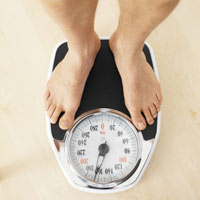The Case Against Dieting 7 Steps To Lifestyle Change
If you've continued reading beyond the title of this article, it's likely that you've grown convinced that most diet and weight loss programs are ineffective -- or at least marginally effective. To further illustrate this, look no further than the advertisements of the companies that make their living selling weight-loss products and programs. In almost every instance, you will see the words results not typical in fine print at the bottom of your screen or ad copy.
So if meaningful, lasting results are not typical of even the most popular diet programs and weight-loss products, why do we continue spending billions of dollars a year on programs, drugs and herbal remedies designed to help us lose weight? The answer is simple to anyone who has struggled with their weight in any significant capacity. We are desperate optimists, willing to spend the money in hopes that the next product or program around the corner will provide us with the results we've been looking for.
While we continue striving for real solutions to our battles with weight issues, the truth is that diets, drugs and herbal remedies do not work. Specifically, while any of these methods may provide short-term results, they are ineffective in producing long-term solutions. This is because our eventual return to "normal" eating habits will ultimately cause a correction that will drive us back in the direction of our original weight prior to beginning the program.
Affecting Lifestyle Change
Before we can address our weight loss goals with a long-term strategy in mind, we need to undergo a process of lifestyle change. At this point it's best to take the process step-by-step -- don't try to change too much at once! It's best to set "smart goals:" specific, measurable, attainable, relevant and timeable. Before we can set these goals, however, there are a few issues that we must first address.
1. Understand Why We Overeat : This process of self-inspection is the first step towards identifying the areas of our lives that need to change in order to achieve our weight-loss goals. Common triggers to overeating include depression, stress, fatigue, boredom, anger, lack of intimacy, feelings of insecurity, and in some cases our own brain chemistry. I recommend keeping a journal for at least 1 - 2 weeks to identify the typical emotions and situations that cause us to overeat. Until you realize why you do what you do, your weight will continue to be a struggle over the long-term.
2. Consider the Cost: Once we have identified the triggers behind our overeating, it's worthwhile to consider the cost vs. reward argument for remaining in this lifestyle. This begins with a realization that food did not solve the problems we faced in the previous step. It only provided a temporary anesthetic.
At this point it might help do draw a line down the middle of a piece of paper. On one side, list the costs of remaining in your current lifestyle. On the other, list the rewards of changing. We do not need to include the cost of changing or the reward of staying the same, because we actually identified these in the previous step. Our reward for staying the same is that we continue to anesthetize ourselves to the situations that triggered our overeating. Or cost of changing is a lifestyle that includes moderation (notice I didn't say deprivation), exercise and accountability.
3. Find a Partner: It has been proven anecdotally as well as scientifically that our chances of success in any endeavor are greater when we have the accountability and support of another person. In this case, our "partner" doesn't necessarily have to be someone who is currently trying to -- or has already managed to -- lose weight, although that would be ideal. It simply needs to be someone who can listen to your concerns and struggles along the way, keep you accountable, and provide some much-needed encouragement. If you are married, your spouse makes an excellent partner, especially if (s)he could benefit from joining you as you pursue a healthier lifestyle.
4. Cut the Cord: This is the most drastic step of the process. At least until eating habits are under control, our target foods -- be it sweets, salties, simple carbohydrates, soft drinks, or something else -- simply cannot enter our shopping baskets. Until we have really dealt with the issues identified in the first step of this process, we cannot trust ourselves to consume these products even in moderation. My recommendation is a minimum 30-day fast from your most favorite comfort foods. After you and your accountability partner agree that you have dealt with your Step 1 issues, then careful, moderate use of these foods may be resumed.
5. Set a Budget: Many of us have no idea how much (or, in most cases, how little) food our bodies need to function and remain healthy. I strongly support Resting Metabolic Rate (RMR) or "burn rate" testing, not just at the beginning of our weight-loss endeavors but periodically throughout your life. This measurement, which can be performed for under $100 at many gyms, health centers and personal trainers' offices nationwide, gives you an accurate snapshot of how many calories your body consumes in a given day. Your goal from here will be to stay within the guidelines of healthy caloric intake for weight loss as outlined by your RMR.
6. Make Wise Choices: A related point is the issue of caloric density. You will quickly learn which foods pack a lot of calories into a small, unfulfilling (at least in the long term) package, and which ones can help you stretch your caloric budget to the max! Some of these foods actually contain fewer calories than your body uses during digestion! One of the products outlined in my review of the Top Three Weight Loss Programs I've found on the Internet includes a menu of these negative-calorie foods.
7. Get Physical: Your body was designed to move! If you make it a point to do some form of aerobic exercise (jogging / walking, swimming, biking, aerobics, etc.) every day (preferably first thing in the morning), your metabolism will respond by speeding up! After your body is used to the added physical activity, try to supplementing your daily activities with 15 - 30 minutes of aerobic activity 5 nights a week and resistance training (weights) 5 - 6 times per week.
There are a few points to keep in mind while you're practicing these seven steps. First, they are not meant to be mutually exclusive! It's especially a good idea to revisit Step One on occasion, to take care of the psychological element of permanent lifestyle change.
Second, remember that deprivation and skipping meals does far more harm than good. If you have a craving for your favorite comfort food (after you have initially weaned yourself), try indulging your craving with a very small amount (ideally controlled by your accountability partner). After fifteen minutes you're satisfied, your craving has passed, and you didn't fall off the wagon! Also, remember that skipping meals slows the metabolism. This is weight-loss suicide!
Third, I cannot stress enough the importance of setting modest, attainable goals throughout this process. There is nothing more discouraging than missing a goal you have set. Miss too many, and you're likely to quit altogether.
Finally, you'll be surprised at how productive small lifestyle changes can be. When you're at a restaurant, they'll typically serve you at least twice what one would reasonably eat. I've found it quite satisfying (and not the least bit embarrassing) to split meals with my wife or my kids at restaurants. Alternatively, you may also ask the waiter for a takeout box as soon as the meal arrives. That way you can place half the meal in the box immediately, and you're less likely to overindulge. Also, try parking at the far end of the parking lot, or walking to the grocery store down the block. You'll be surprised how quickly those extra steps add up!
I certainly wish you the best as you embark on your own process of permanent lifestyle change. Should you desire more information on the topic, please feel free to visit my daily blog on health and nutrition topics.
-
Interesting information about the lemonade diet
Are you looking for cleansing your body? Following a lemonade diet
-
Effectively Losing Weight Fast
Many people understand that they need to
-
The Surprising Thing That The Worlds Heaviest Countries Have In Common
-
Your Genes are Not to Blame, Even If They Don't Fit
Your Genes Are Not to Blame, Even if They Dont Fit By Heather Carus
-
Osteoporosis vs. rheumatoid arthritis: Causes, symptoms, risk factors, and complications
Rheumatoid arthritis (RA) and osteoporosis both affect the body
-
Weight Loss Affirmations And Their Potency
One thing this article would want to explain on the onset is how the p
- DON'T MISS
- Look And Feel Great For The Holidays Get Started Now
- How To Get Over A Weight Loss Plateau
- Diabetes What Are The Dangers Of Diabetes And How Does Diabetes Affect Weight Loss
- Cash Can Coax Dieters To Lose Weight
- Get Your Best Beach Body with 50 Ways to Burn 50 Calories This Summer
- Creating The Perfect Diet Plan For You
- 7 Essentials For Fat Loss
- Weightloss Hints
- How To Maximize Your Weight-Loss Potential
- Understanding Menopause and Weight Gain




